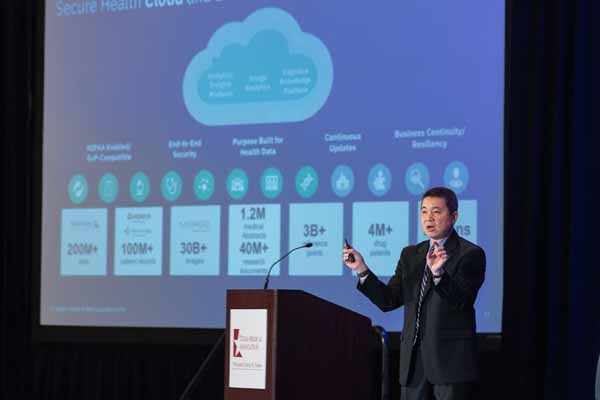
Physicians should adapt quickly as medicine enters a new era of technology in which advanced computer systems provide help via "augmented intelligence," or AI, says Kyu Rhee, MD, chief health officer at IBM Watson Health.
"Being the nation's largest, and one of the oldest and most innovative medical associations, you need to make sure you're at the table [to help decide] how this AI era evolves so that other stakeholders [in AI] don't make decisions on your behalf," he told physicians Saturday at the Texas Medical Association's Fall Conference.
AI systems like IBM's Watson, a cognitive computing system capable of answering questions posed in natural language, can help put important information at a doctor's fingertips while he or she is sitting with a patient. The AI system can make sense of an overwhelming amount of clinical, genomic, environmental, and social determinants of health data to help a physician identify the best treatment options.
"We know all these things play a role in how you make decisions with your patients," Dr. Rhee said.
The idea is not to replace the physician's judgment or medical abilities, but to enhance them, Dr. Rhee says. Human qualities such as common sense, imagination, abstraction, and compassion can be helped by AI systems’ strengths, such as pattern recognition, reduced practice variation, and almost endless knowledge capacity.
"It's how these systems — these AI systems — can be used with humans to make better decisions," he said. "It's more like Star Trek: The concept of a computer that helps support the different stakeholders to make decisions."
Dr. Rhee gave examples of how Watson, which is being used to support cancer care in more than 230 hospitals and health organizations, can make life easier for all physicians. For instance, it can:
- Rank different treatment options, linking to peer-reviewed studies, for a physician to review with a patient;
- Help people with diabetes better manage glucose levels;
- Identify real-world evidence to understand the impact of maternal health programs for newborns; and
- Eliminate the need to manually compare enrollment criteria with patient medical data to help match patients with potentially life-saving clinical trials.
In the future, blockchain — powered by AI —also could give patients more control of their medical data, Dr. Rhee says, by allowing them to pass it along to organizations, physicians, or others they believe could benefit. For instance, a cancer patient could share de-identified data with the American Cancer Society to help with medical studies.
"In the future, the same way you can donate your organs when you die, what if you could donate your data when you’re alive?" Dr. Rhee asked. "This concept of data will now be in a place where our patients will be empowered."
For physicians, he says, AI's ability to help physicians access and use data easily ultimately will make it a tool that is as common as a stethoscope.
"That's fundamentally what this is about," he said. "Physicians are looking for ways that to translate their systems of records, like EMRs, to systems of insight, to create a big data stethoscope so that you can provide better care for your patients."